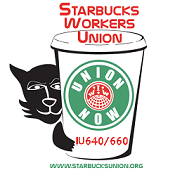Union for Starbucks Workers Expands to Chicago
Submitted on Thu, 08/31/2006 - 1:54am
 First Group of Baristas Outside of New York City Joins the IWW Starbucks Workers Union
First Group of Baristas Outside of New York City Joins the IWW Starbucks Workers Union
Chicago, IL- Baristas at Chicago’s Logan Square Starbucks store announced last night their membership in the IWW Starbucks Workers Union (www.starbucksunion.org), becoming the first U.S. workers outside of New York City to declare union membership at the world's largest coffee chain.
Workers served Starbucks management at the café, located on 2759 W Logan Blvd., with a declaration of union membership and a set of demands including a living wage, guaranteed work hours, reinstatement of IWW baristas fired for organizing activity, and respect for an independent voice on the job through union membership.
"I work hard every day for an extremely profitable company yet I have to scrounge to make ends meet," said Joe Tessone, an IWW barista at the Logan Square store. “Across the country, Starbucks workers are inspired by the victories achieved by IWW Starbucks Workers Union members in New York, and here in Chicago we are using direct action against the company to improve our working conditions.”
Based on Starbucks' surveillance of union activity, senior level management was prepared for the workers' surprise action. In an unprecedented move, the store manager was joined by the district manager, regional director, and "partner" resources manager to disparage the union and intimidate workers from asserting their rights. Becky Critch of "partner" resources even went so far as to say the union doesn't exist to which workers replied, "we're dues-paying members of the IWW Starbucks Workers Union." Starbucks also handed out the preamble to the IWW constitution which outlines the union's long-term vision for economic change.
In stark contrast to its employee-friendly image, Starbucks workers in Chicago and around the world face low wages and barriers to healthcare and other benefits. After years of promoting itself as a leader in employee health care, Starbucks was forced to admit that only 42% of its employees (including management) are covered by company health care- that figure is lower than Wal-Mart's 47%, a company often condemned for its poor health care package.
In Chicago, baristas start at only $7.50 per hour and, like all café workers at the company, are not guaranteed any number of work hours per week. Employees who expect to work full-time are often not given the necessary number of hours to qualify for healthcare benefits.
"As union members, my co-workers and I will never have to worry about being taken advantage of," said Christine Morin, a barista at the Logan Square store and IWW Starbucks Workers Union member. "The only way Starbucks will live up to its socially responsible image is for workers to stand together and demand that our rights are recognized and respected."
Founded in 2004, the IWW Starbucks Workers Union- with members at seven Starbucks locations- has won three wage increases, more consistent scheduling, and some safety improvements at Starbucks stores in New York City. The union uses direct pressure against the company on the job and in the community to win demands and remedy member grievances with management. The union's organizing approach is known as solidarity unionism whereby workers themselves control their own organization; power is exerted without interference from the government or union bureaucrats; and organizing takes place regardless of certification status. Like many labor organizations, the IWW Starbucks Workers Union does not get involved in government certification elections because of the fatal flaws in that system. Starbucks does not recognize the union and is waging a relentless campaign to crush the organization, which resulted in a large complaint leveled against the company by the National Labor Relations Board. The government settlement agreement of those charges is available on the web at http://starbucksunion.org/node/712. "The Chicago baristas joining the IWW is proof of solidarity unionism's scalability," said Daniel Gross, an organizer with the IWW Starbucks Workers Union and a former barista fired by the company for union activity. "Through direct action and mutual aid, workers at the multinational retailers like Borders, Wal-Mart, and Starbucks can stand together for democracy at work and justice in society."